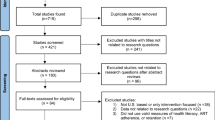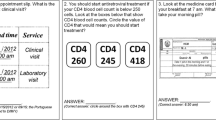Abstract
BACKGROUND
Prior studies have linked limited literacy to poorer HIV medication adherence, although the precise causal pathways of this relationship have only been initially investigated.
OBJECTIVE
To examine whether social stigma is a possible mediator to the relationship between literacy and self-reported HIV medication adherence.
DESIGN
Structured patient interviews with a literacy assessment, supplemented by medical chart review, were conducted among patients receiving care at infectious disease clinics in Shreveport, Louisiana and Chicago, Illinois. Literacy was measured using the Rapid Estimate of Adult Literacy in Medicine (REALM), while stigma was measured using items taken from the Patient Medication Adherence Questionnaire (PMAQ).
PARTICIPANTS
Two hundred and four consecutive patients participated.
RESULTS
Approximately one-third of the patients (30.4%) were less than 100% adherent to their regimen, and 31.4% had marginal (7th–8th grade) or low (≤ 6th grade) literacy. In multivariate analyses, patients with low literacy were 3.3 times more likely to be non-adherent to antiretroviral regimens (95% CI 1.3–8.7; p < 0.001). Perceived social stigma was found to mediate the relationship between literacy and medication adherence (AOR 3.1, 95% CI 1.3–7.7).
CONCLUSIONS
While low literacy was a significant risk factor for improper adherence to HIV medication regimens in our study, perceived social stigma mediated this relationship. Low literacy HIV intervention strategies may also need to incorporate more comprehensive psychosocial approaches to overcome stigma barriers.
Similar content being viewed by others
References
Kalichman SC, Ramachandran B, Catz S. Adherence to combination antiretroviral therapies in HIV patients of low literacy. J Gen Intern Med. 1999;14(5):267–73.
Wolf MS, Davis TC, Osborn CY, Skipkauskas S, Bennett CL, Makoul G. Literacy, self-efficacy, and HIV medication adherence. Patient Educ Couns. 2007;65(2):253–60.
Miller LG, Liu H, Hays RD, et al. Knowledge of antiretroviral regimen dosing and adherence: a longitudinal study. Clin Infect Dis. 2003;36:514–18.
Paasche-Orlow MK, Cheng DM, Palepu A, Meli S, Faber V, Samet JH. Health Literacy, Antiretroviral Adherence, and HIV-RNA Suppression: A Longitudinal Perspective. J Gen Intern Med. 2006;21(8):835–40.
Pignone MP, Dewalt D. Literacy and health outcomes Is adherence the missing link? J Gen Intern Med. 2006;21(8):896–7.
Gazmararian JA, Kripalani S, Miller MJ, Echt KV, Ren K, Rask K. Factors associated with medication refill adherence in cardiovascular-related diseases: a focus on health literacy. J Gen Intern Med. 2006;21(12):1215–21.
Paasche-Orlow MK, Wolf MS. the causal pathways linking health literacy to health outcomes. Am J Health Behav. 2007;31(Suppl 1):S19–26.
Crandall CS, Coleman R. AIDS-related stigmatization and the disruption of social relationships. Pers Relatsh. 1992;9:163–77.
Moneyham L, Seals B, Demi A, Sowell R, Cohen L, Guillory J. Perceptions of stigma in women infected with HIV. AIDS Patient Care STDS. 1996;10:162–7.
Herek GM, Capitanio JP. Aids and sexual prejudice. Am Behav Sci. 1999;42:1130–47.
Herek GM, Capitanio JP, Widaman KF. HIV-related stigma and knowledge in the United States: Prevalence and trends. Am J Public Health. 2002;92:371–7.
Blendon RJ, Donelan K. Discrimination against people with AIDS: The public’s perspective. New Engl J Med. 1988;319:1022–6.
Burris S. Studying the legal management of HIV-related stigma. Am Behav Sci. 1999;42:1229–43.
Craft SM, Serovich JM. Family-of-origin factors and partner violence in the intimate relationships of gay men who are HIV positive. J Interpers Violence. 2005;20(7):777–91.
D’Augelli AR. AIDS fears and homophobia among rural nursing personnel. AIDS Educ Prev. 1989;1:277–84.
Derlega VJ, Lovejoy D, Winstead BA. Personal accounts on disclosing and concealing HIV-positive test results: weighing the benefits and risks. In Derlega VJ, Barbee AP, eds. HIV and Social Interaction. Thousand Oaks, CA: Sage: 1998:147–64.
Goldin CS. Stigmatization and AIDS: critical issues in public health. Soc Sci Med. 1994;39:1359–66.
Heckman TG, Somlai AM, Kalichman SC, Franzoi SL, Kelly JA. Psychosocial differences between urban and rural people living with HIV/AIDS. J Rural Health. 1998;14:138–45.
Liebschutz JM, Geier JL, Horton NJ, Chuang CH, Samet JH. Physical and sexual violence and health care utilization in HIV-infected persons with alcohol problems. AIDS Care. 2005;17:566–78.
Marzuk PM, Tierney H, Tardiff K, et al. Increased risk of suicide in persons with AIDS. JAMA. 1988;259:1333–7.
Chesney MA, Smith AW. Critical delays in HIV testing and care: The potential role of stigma. Am Behav Sci. 1999;42:1162–74.
Golin C, Isasi F, Bontempi JB, Eng E. Secret pills: HIV-positive patients’ experiences taking antiretroviral therapy in North Carolina. AIDS Educ Prev. 2002;14(4):318–29.
Rintamaki LS, Davis TC, Skipkauskas S, Bennett CL, Wolf MS. Social stigma and HIV medication adherence. AIDS Patient Care STDS. 2006;20(5):359–68.
Fogarty L, Roter D, Larson S, Burke J, Gillespie J, Levy R. Patient adherence to HIV medication regimens: a review of published and abstract reports. Patient Educ Couns. 2002;46(2):93–108.
Singh N, Berman SM, Swindells S, et al. Adherence of immunodeficiency virus infected patients to antiretroviral therapy. Clin Infect Dis. 1999;29(4):824–30.
Parikh NS, Parker R, Nurss JR, Baker DW, Williams MV. Shame and health literacy: the unspoken connection. Patient Educ Couns. 1996;27:33–9.
Wolf MS, Williams MV, Parker RM, Parikh NS, Nowlan AW, Baker DW. Patients’ shame and attitudes toward discussing the results of literacy screening. J Health Comm. 2007;12:1–12.
Stirratt MJ, Remien RH, Smith A, et al. The role of HIV serostatus disclosure in antiretroviral medication adherence. AIDS Behav. 2006;10(5):483–93.
Peretti-Watel P, Pierret J, Lert F, Obadia Y. The Vespa Group Management of HIV-related stigma and adherence to HAART: Evidence from a large representative sample of outpatients attending French hospitals. AIDS Care. 2006;18(3):254–61.
Kalichman SC, Rompa D. Functional health literacy is associated with health status and health-related knowledge in people living with HIV-AIDS. J Acquir Immune Defic Syndr Hum Retrovirol. 2000;25(4):337–44.
Osborn CY, Paasche-Orlow MK, Davis TC, Wolf MS. Health literacy: An overlooked factor in understanding HIV health disparities. Am J Prev Med. 2007;33(5):374–8.
Wolf MS, Davis TC, Arozullah A, et al. Relation between literacy and HIV treatment knowledge among patients on HAART regimens. AIDS Care. 2005;17(7):863–73.
Demasi RA, Graham NM, Tolson JM, et al. Correlation between self-reported adherence to highly active antiretroviral therapy (HAART) and virologic outcome. Adv Ther. 2001;18(4):163–73.
Demasi RA, et al., Self-reported adherence to HAART and correlation with HIV RNA: initial results with the patient medication adherence questionnaire. Paper presented at the sixth conference on retroviruses and opportunistic infections (1999).
Frable DE, Blackstone T, Scherbaum C. Marginal and mindful: Deviants in social interactions. J Pers Soc Psychol. 1990;59:140–9.
Limandri BJ. Disclosure of stigmatizing condition: The discloser’s perspective. Arch of Psychiatr Nurs. 1989;3:69–78.
Goffman E. Stigma: Notes on the Management of Spoiled Identity. Englewood Cliffs, NJ: Prentice-Hall; 1963.
Hiller DV. Overweight as master status: A replication. J Psychol. 1982;110:107–13.
Davis TC, Michielutte R, Askov EN, Williams MV, Weiss BD. Practical assessment of adult literacy in healthcare. Health Educ Behav. 1998;25:613–24.
Davis TC, et al. Literacy testing in health care research in understanding health literacy: implications for medicine, public health. In: Schwartzberg JG, VanGeest JB, Wang CC, eds. AMA Press: Chicago, IL; 2004:157–79.
Parker RM, Baker DW, Williams MV, Nurss JR. The test of functional health literacy in adults: a new instrument for measuring patients’ literacy skills. J Gen Intern Med. 1995;10:537–41.
Baron RM, Kenny DA. The moderator-mediator distinction in social psychology research: conceptual, strategic, and statistical considerations. J Pers Soc Psychol. 1986;51:1173–82.
Vanable OA, Carey MP, Blair DC, Littlewood RA. Impact of HIV-related stigma on health behaviors and psychological adjustment among HIV-positive men and women. AIDS Behav. 2006;10(5):473–82.
Berger BE, Ferran CE, Lashley FR. Measuring stigma in people with HIV: psychometric assessment of the HIV stigma scale. Res Nurs Health. 2001;24(6):518–29.
Glass TR, De Geest S, Weber R, et al. Correlates of self-reported nonadherence to antiretroviral therapy in HIV infected patients: the Swiss HIV Cohort Study. J Acquir Immune Defic Syndr. 2006;41:385–92.
Gallant JE, DeJesus E, Arribas JR, et al. Tenofovir DF, emtricitabine, and efavirenz vs. zidovudine, lamivudine, and efavirens for HIV. N Engl J Med. 2006;354:251–60.
Doak CC, Doak LG, Root JH. Teaching Patients with Low Literacy Skills. 2nd ed. Philadelphia: Lippincott; 1996.
Gerber BS, Brodsky IG, Lawless KA, et al. Implementation and evaluation of a low-literacy diabetes education computer multimedia application. Diabetes Care. 2005;28:1574–80.
Davis TC, Fredrickson DD, Arnold C, Murphy PW, Herbst M, Bocchini JA. A polio immunization pamphlet with increased appeal and simplified language does not improve comprehension to an acceptable level. Patient Educ Couns. 1998;35:25–3.
Davis TC, Williams MV, Marin E, Parker RM, Glass J. Health literacy and cancer communication. CA Cancer J Clin. 2002;52:134–49.
Lorig KR, Holman H. Self-management education: history, definition, outcomes, and mechanisms. Ann Behav Med. 2003;26:1–7.
Gifford AL, Laurent DD, Gonzales VM, Chesney MA, Lorig KR. Pilot randomized trial of education to improve self-management skills of men with symptomatic HIV/AIDS. J Acquir Immune Defic Syndr Hum Retrovirol. 1998;18:136–44.
Bodenheimer T, Lorig K, Holman H, Grumbach K. Patient self-management of chronic disease in primary care. J Amer Med Assoc. 2002;288:2469–75.
Heckman TG, Barcikowski R, Ogles B, et al. A telephone-delivered coping improvement group intervention for middle-aged and older adults living with HIV/AIDS. Ann Behav Med. 2006;32(1):27–38.
Jones DL, McPherson-Baker S, Lydston D, et al. Efficacy of a group medication adherence intervention among HIV positive women: the SMART/EST Women’s Project. AIDS Behav. 2007;11(1):79–86.
Makoul G. The Segue framework for teaching and assessing communication skills. Pat Ed Counsel. 2001;45:23–34.
Murray MD, Young J, Hoke S, et al. Pharmacist intervention to improve medication adherence in heart failure: a randomized trail. Ann Intern Med. 2007;146(10):714–25, May.
Acknowledgments
Grant support
None
Conflict of Interest
None disclosed.
Author information
Authors and Affiliations
Corresponding author
Rights and permissions
About this article
Cite this article
Waite, K.R., Paasche-Orlow, M., Rintamaki, L.S. et al. Literacy, Social Stigma, and HIV Medication Adherence. J GEN INTERN MED 23, 1367–1372 (2008). https://doi.org/10.1007/s11606-008-0662-5
Received:
Revised:
Accepted:
Published:
Issue Date:
DOI: https://doi.org/10.1007/s11606-008-0662-5




